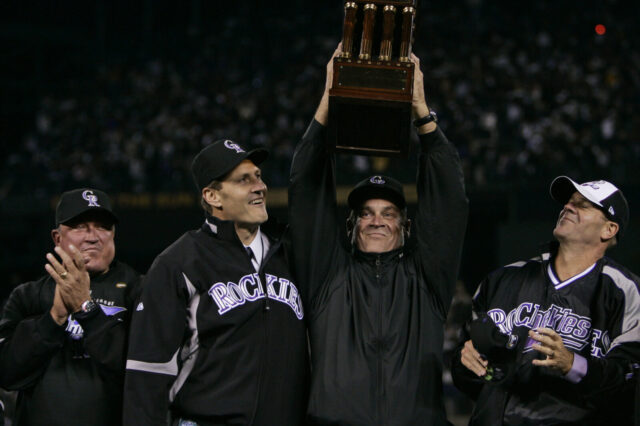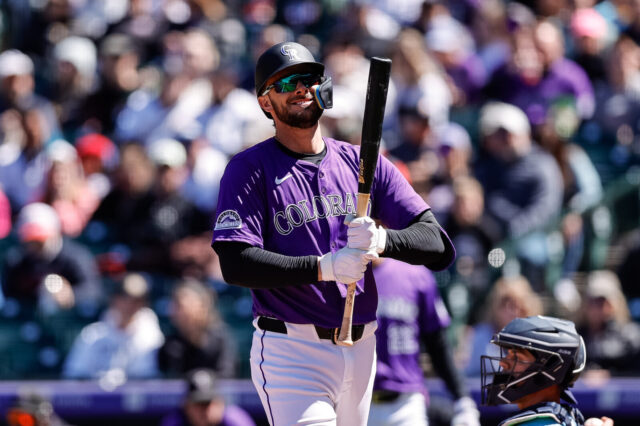Prior to the 2018 campaign, the Colorado Rockies’ worst offensive season came in 2008. In fact, that’s the only year in franchise history that the Rockies finished in the bottom half of the majors in offense, and one of just eight seasons in which they finished outside the top 10. The 2008 Rockies ranked 18th in offense with 4.61 runs scored per game.
Nearing the completion of two months of baseball in 2018, though, this year’s Rockies are on pace to set new lows in offensive production. Through 49 games of the season, Colorado is averaging an even 4.0 runs per game, 21st in the big leagues. When adjusted for park factors, though, the Rockies have the worst offense in baseball.
To further understand the struggles these Rockies are facing at the plate, and to see where they stack up with 2008’s struggles, let’s compare both teams at the same point in the season.
In some ways, the batting statistics through the first quarter-plus in 2008 are similar to 2018. Coming off a National League pennant, the Rockies struggled to duplicate the same success at the plate, ranking 22nd in baseball by scoring 4.2 runs per game through 49 games. Though marginally better than this year’s run production, the teams ranked within one spot of each other.
However, the route by which both teams accrued those runs is vastly different. The 2008 Rockies began the year hitting .256 and averaging 9.0 hits per game, good for 18th and 11th in the majors. In 2018, the Rockies are only batting .230 (26th) with 7.7 hits per game (22nd).
What this year’s squad has lacked in batting average and on-base percentage (.304, 25th), they have slightly made up for with top-10 power. The Rockies have hit 60 home runs in 49 games this season, a per-game average that ranks 10th in the major leagues. In 2008, the Rockies began the season averaging just above 0.70 long balls per contest to rank 23rd.
Each team’s approach at the plate has also been different. Though it has resulted in top-10 power, the Rockies average nearly nine strikeouts per game, a figure that ranks in the bottom third of the majors. That is up more than two strikeouts per game compared to the beginning of the 2008 season.
So what does all this mean? For starters, it’s important to recognize that the offensive inadequacies have not derailed the season. Despite having a historically bad offense, Colorado holds a one-game lead in the NL West with a record of 26-23.
At the same point in the 2008 season, the Rockies sat 16 games below .500 and were 11 games back of the first-place Arizona Diamondbacks. Despite playing great baseball in July, the Rockies were in too deep a hole and never got closer than eight games below .500.
Though it ranks in the bottom third of the MLB, Colorado’s 4.40 ERA would be its best single-season mark since the 2010 staff tossed 4.14. This year, Colorado is allowing nearly a half-run less per game at the same point of the season in 2008.
It’s also useful to examine how the 2008 club finished the season. After the slow start, the Rockies improved in nearly every unadjusted offensive category. Despite a slight drop in OBP and increase in strikeout rate, statistics improved across the board. The unadjusted average of 4.61 runs ranked 18th, and the team had a slash line of .263/.302/.415 (16th/25th/15th in baseball). The Rockies’ current slash line of .230/.304/.390 is significantly worse when compared to league averages (26th/25th/23rd).
All that said, two things are apparent. First, in terms of offensive production, this year’s team would set lows in nearly every per-game statistical category if the season ended today. Even if steady improvement were to happen, as it did in 2008 after a shoddy start, the Rockies’ offense has long way to go just to produce an average season for the team’s offensive standards.
However, by no means does their start offensively signify a letdown year. In a division that has collectively underperformed, the Rockies are in first place. For that to continue, adjustments must be made. Whether it be lineup changes, coaching adjustments or something else, there’s no denying the need for progress across the board.
Should improvement bestow itself upon this year’s club as it did during the team’s worst offensive season in 2008, though, the Rockies could be in store for October baseball once more.



